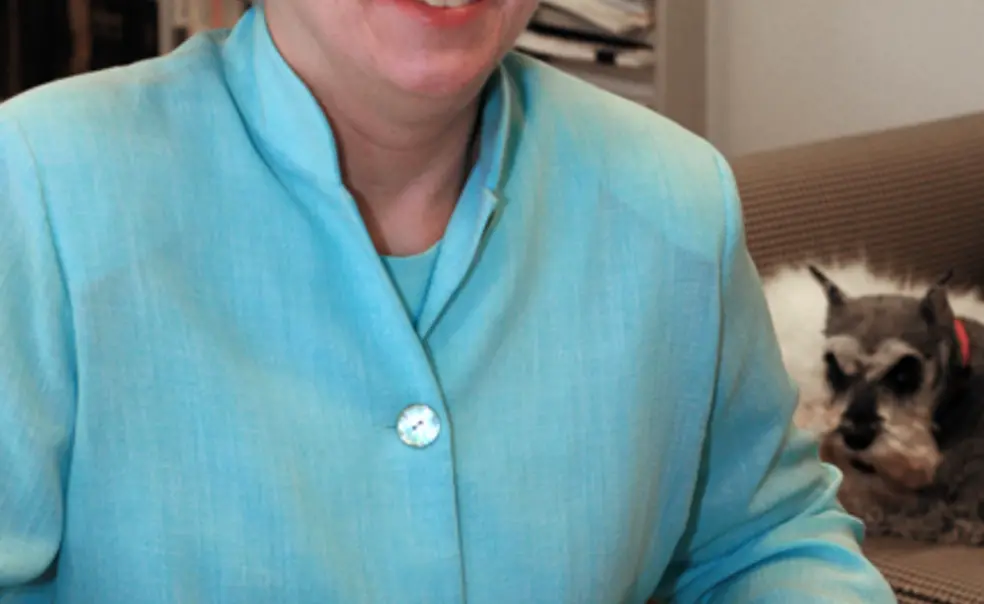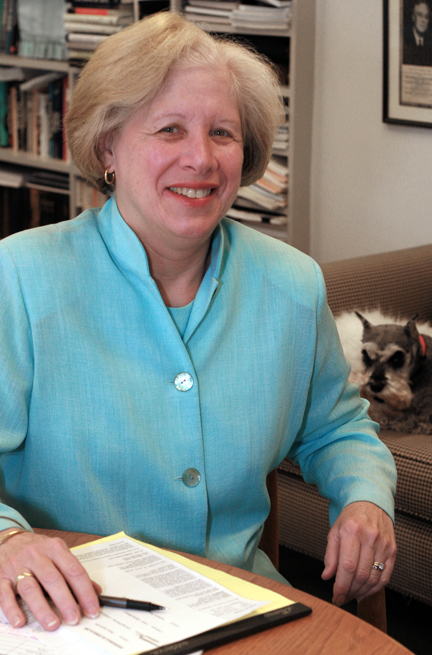Malkiel plans to step down after 24 years as dean
To walk into Nancy Weiss Malkiel’s office in West College is to be reminded at once that the dean of the college is, first and foremost, a historian. Her walls are decorated with framed campaign posters for what seems like every Democrat since Woodrow Wilson 1879, although a life-sized cardboard cutout of George H.W. Bush obscures the visage of Adlai Stevenson ’22 on the wall behind him. Skipper, Malkiel’s miniature schnauzer and constant companion, sleeps soundly in front of her desk.
Malkiel has announced her intention to step down as dean, a post she has held since 1987, at the end of this academic year. She will depart as Princeton’s longest-serving dean of the college, responsible for the undergraduate academic program. Like all good historians, she attempts to impose some order on the past by dividing her 41-year Princeton career into phases.
Nancy Weiss, as she then was known, was one of only three women on the faculty when she arrived at Princeton in 1969. Her male colleagues, she said, regarded her as a curiosity at first, which led to social invitations and offers to sit on academic committees. She would reciprocate social invitations by hosting dinner parties in her small apartment.
“I know full well why I was invited to do those things in the beginning,” she said. “They wanted ‘one of us’ and there were so few of ‘us.’ But the way I looked at it, it gave me the chance to experience much more broadly than a normal assistant professor a wide range of opportunities here and then I could pick and choose.”
Starting in the late 1970s, Malkiel and the late professor Richard Challener co-taught History 383, a popular survey course covering American history from 1940 onward, a course known fondly to many undergraduates as the “Dick and Nancy Show.” She also served as a thesis adviser and mentor to a generation of students, including historian and former Columbia provost Alan Brinkley ’71.
“She was, even in her first years as a faculty member just out of graduate school, a dedicated and inspired teacher,” Brinkley recalled in an e-mail. “Princeton is a very different place from the one I knew as an undergraduate, and much of what is now better is a result of her efforts.”
Malkiel continued to teach throughout Phase Two of her career, which began in 1982 when she was named the first master of Mathey College. Phase Three began in 1987, when she was appointed dean of the college, succeeding Joan Girgus.
It was during those years that Malkiel met her future husband, Burton Malkiel *64, now the Chemical Bank Chairman’s Professor of Economics. Both say they got to know each other well when she asked him to serve on a faculty committee she chaired that was considering whether to create a program in women’s studies.
“He asked whether there would be many meetings and I said, ‘Oh, not too many,’” Dean Malkiel said coyly. They began dating in 1987 and were married just over a year later.
Although she continued to teach History 383 and a few freshman seminars, Malkiel said that demands on her time eventually forced her to concentrate solely on administration.
While Malkiel has played a lead role in a number of significant initiatives, her most controversial by far has been the revision of grading standards in 2004. Although she said the change expressed the faculty’s expectation that students receive top marks only for their best work, students have derided it as grade deflation. Comments posted on The Daily Princetonian’s website about Malkiel’s decision to step down as dean were frequently bitter and occasionally ad hominem, though she had her defenders as well.
Malkiel said she has made it a policy not to read such comments. “Giving students the unbridled opportunity for making anonymous cracks about people, I don’t think is a good practice,” she said. “Students are students, and if not getting as many A’s as they would like is the thing about undergraduate education that has them most riled up, we’re doing a pretty good job.”
As she prepares to embark upon Phase Four of her career, Malkiel says that she will take a sabbatical next year — her first since 1987 — to research and write a book about the introduction of coeducation at Princeton. That book seems certain to lead her back into the classroom, teaching a freshman seminar on coeducation.
Highlights of Nancy Weiss Malkiel’s tenure as dean
• Opening of the first four-year residential colleges
• Establishment of the Princeton Writing Program
• Introduction of new general-education requirements
• Support for student learning through the McGraw Center for Teaching & Learning
• Improvement of study-abroad and international internship programs
• Introduction of the bridge-year program
• Grading-policy revision













1 Response
Owen P. Curtis ’72
10 Years AgoFirst college: Wilson
While there may have been many highlights to retiring Dean Nancy Weiss Malkiel’s tenure, one of them was not the “opening of the first four-year residential colleges” as stated in PAW (Campus Notebook, Oct. 13). That happened prior to the dean’s arrival at Princeton. In the summer of 1968, the members of the incoming Class of 1972 were invited by then-Master Julian Jaynes to consider joining Wilson College, which was opening for the first time to freshmen. Having seen Commons firsthand during visits, I eagerly applied, and was delighted to join some four dozen other lucky members of the class who settled into 1915 and Gauss halls.
A center of diversity, a positive welcome to the advent of women, a very south-campus location, our own dining hall, and fine masters in Professor Jaynes and then Professor John Fleming *63 made Princeton’s first residential college a distinct and pleasant choice. To this day, the friendships formed there remain central to my Princeton experience. Cheers for Wilson College!